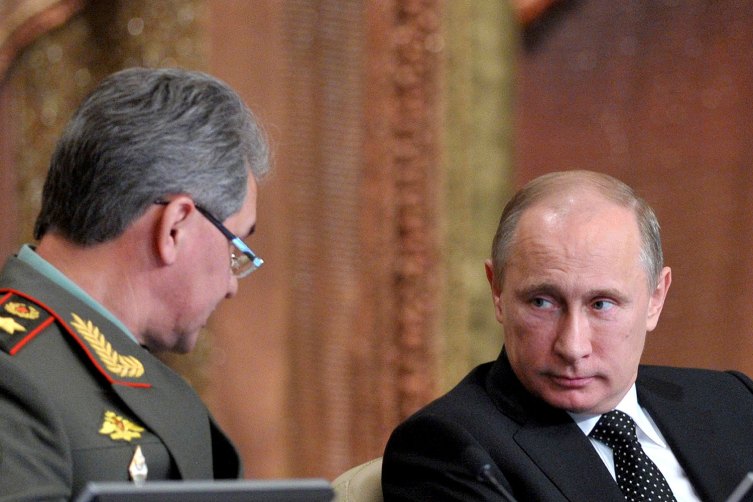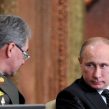
Chagrin and Ambivalence in Putin’s Foreign Policy
Publication: Eurasia Daily Monitor Volume: 10 Issue: 45
By:

Entering the second year of his third presidency, President Vladimir Putin has shown uncharacteristically scant interest to foreign policy matters perhaps suspecting that Western “partners” are sponsoring Russia’s opposition movement and that neighboring post-Soviet leaders and even Chinese “friends” are losing confidence in his leadership. He keeps Prime Minister Dmitry Medvedev on a short leash—having him perform investor-courting functions—so that some more important government tasks are delegated to the newly-appointed Defense Minister Sergei Shoigu. Last week (March 5), Shoigu paid an alliance-reviving visit to Vietnam and finalized a deal on selling and servicing submarines, as well as negotiated a provisional agreement on the use of supply and maintenance facilities at Cam-Ranh by the Russian Navy (Rossiiskaya Gazeta, March 7). And yet, despite his domestic preoccupations, urgent matters in external affairs continue to demand Putin’s attention.
The gravest news last week was the death of Venezuela’s President Hugo Chavez, which came as an unpleasant reminder that larger-than-life leaders are, in fact, mortal. Putin duly called Chavez a “big friend of Russia,” but clearly did not want to be associated with such fans of the late commandant as Alyaksandr Lukashenka or Mahmoud Ahmadinejad. As a result, he sent to Caracas an embarrassingly low-level delegation headed by Igor Sechin, who had cultivated a personal friendship with Chavez but has no position in the current Russian government (Gazeta.ru, March 7). Venezuela has been one of the few “allies” valued for demonstrating that Russia still has a global reach of sorts. But now most of the investments in oil projects and loans for arms deals will likely have to be written off (Kommersant, March 7). Putin has never shared Chavez’s leftist passions but appreciated his sincere anti-Americanism, knowing that the Kremlin’s own invectives have to be tempered by “strategic” considerations. Therefore, Sechin saw nothing inappropriate in making a stop in Houston, Texas, on the way to Caracas in order to convince investors in the United States to financially back Rosneft (Newsru.com, March 8). What irks Putin most, however, was Chavez’s natural ability to connect with his electorate, while no amount of political “technologies” could check the alienation of Russia’s scandalously corrupt elites from the “masses.”
Another inescapable bother for Putin last week was the meeting with Ukraine’s President Viktor Yanukovich, who had celebrated the third anniversary of his electoral victory with the long-postponed summit with the European Union (Novaya Gazeta, March 4). Putin carefully tried to steer Yanukovich into a tight corner, where his only option should have been capitulation in the form of committing Ukraine to join the Customs Union of Russia, Kazakhstan and Belarus (Vedomosti, March 5). The Kremlin cannot quite understand how Putin’s “brotherly” counterpart managed to escape from this trap, but Yanukovich took full advantage of the cancellation of the visit to Moscow scheduled for last December to gain new space for maneuver (Gazeta.ru, March 6). His new leverage came from the steady weakening of Russia’s position on the European energy market. As a result, the Ukrainian president felt empowered to reject Moscow’s demand of a $7 billion penalty for not importing all the contracted volumes of gas in 2012 and to insist on re-negotiating the extra-high prices. Kazakhstan has also discerned this weakness and now demands higher prices for the gas that it exports to Russia, while emphasizing the new gas pipeline to China that will be completed next year (Kommersant-Vlast, March 4).
Yet another foreign policy headache is the sharp escalation of tensions on the Korean Peninsula following Pyongyang’s February 12 nuclear test conducted disturbingly close to the Russian border. The most disconcerting feature of this crisis for Putin is that Moscow has practically no say in its management. Rather, China decided what new sanctions to impose through the United Nations Security Council Resolution 2094 adopted last Thursday, and the US and South Korea attempted to figure out how to deter North Korea’s hysterical behavior (Kommersant, March 9). Putin cannot fail to see that Russia’s profile in the Asia-Pacific region that was expected to gain a boost from the Asia-Pacific Economic Cooperation (APEC) summit in Vladivostok last September is in fact fast shrinking. Much similar irrelevance is becoming a feature of Russia’s position on the Iranian nuclear program, which has driven the protracted international crisis to a high-risk final phase, while Moscow keeps pretending that a political solution exists (Nezavisimaya Gazeta, March 6).
The working assumption in Russian foreign policy appears to be that the Iranian crisis will not reach a “red line” until the civil war in Syria comes to an end—and the current assessment is that it is nowhere a final resolution. Moscow expects the West to become increasingly concerned about the consequences of a collapse of the Bashir al-Assad regime and so to curtail the support for the opposition, which resorts to such unacceptable actions as taking UN peacekeepers hostage (Kommersant, March 7). Indeed, US Secretary of State John Kerry prioritized Syria in his first meeting with Russian Foreign Minister Sergei Lavrov. But despite the mutual satisfaction over this re-launched “reset,” there are few signs of any real intentions to reach common ground (Gazeta.ru, February 28). The Kremlin is not particularly concerned by the West’s supply of arms to the disunited Syrian opposition but is certain to be irked by last week’s ceremony at the White House where Elena Milashkina, a journalist from the fiercely independent Novaya Gazeta, received the International Woman of Courage award (Novaya Gazeta, March 9).
This deserved honor brings into focus the plain fact that the frustrations of Russia’s foreign policy originate at home. Every turn of events in the global arena reveals a particular weakness of the degenerating regime. Even International Women’s Day brought attention back to the outrageous persecution of the young women from the Pussy Riot punk rock group. Doubts in his ability to preserve monopoly control over political power are the main determinant of Putin’s decision-making, and a long track record in demonstrating confidence cannot bring back genuine belief in Russia’s rise. Although Putin’s position still remains quite strong, he does not appreciate his peers increasingly looking over his shoulder in search of his potential successor.




